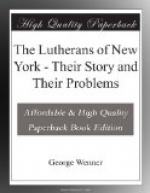We may concede the hegemony of English in the political and intellectual life of America, but in a great country like America there is room for others also. It is a narrow view of our civilization to make “American” synonymous with English. America is not the dumping ground of the nations. It is a land where the best ideals of all nations may be reproduced and find room for expansion and growth.
The German and Scandinavian churches of New York are not ignorant of the importance of the English language in the maintenance of their church work. (See table of Churches in the Appendix.) With scarcely an exception they make all possible use of English in their services. This they are compelled to do in order to reach their children. In this way, and by making generous contributions of their members to the English churches, they are doing their full share in the general work of church extension in the English language.
They send their sons into the ministry to an extent that has not been approached by our English churches. (See Appendix under Sons of the Church.) Nearly all of these are bi-lingual in their ministerial work and many of them serve exclusively English churches. There is a proverb about killing the goose that lays the golden egg, which we would do well to bear in mind.
Concordia Seminary in St. Louis, founded by Dr. Walther and the Germans of Missouri, numbers 344 students. Candidates for graduation must be able to minister in at least two languages. In a polyglot church such as ours this would seem to be a policy worthy of imitation.
The fifteen languages in which we minister to our people confer upon us an honorable distinction. Each one represents an individuality which cannot be ignored, some spiritual gift which is worth exercising and preserving. By keeping in touch with this many-sided life we enrich our own lives, obtain broader conceptions of the church’s mission, and fit ourselves for more effective service in this most cosmopolitan city of the world. Instead of trying to exterminate these languages, let us cultivate a closer acquaintance with them and let us pray for that pentecostal spirit which will enable us to say “we do hear them speak in our tongues the wonderful works of God.”
The Problem of Membership
Three classes of members are recognized in our churches:
1, Those who have been baptized. 2, Those who have
been confirmed-that is, those who after the prescribed
course of instruction and examination have been admitted
to the communion. 3, Communicants-that is, those who
are in active fellowship with the church in the use
of the word and the sacrament.*
The temporal affairs
of the congregation as a civic corporation
are regulated by the State and the qualifications
of a voting member are defined in the laws of the
State. This chapter deals only with the question
of membership in the church as a spiritual body.
In general the State readily acquiesces in the polity
of the various churches so long as it does not interfere
with the civic rights of the individual.




